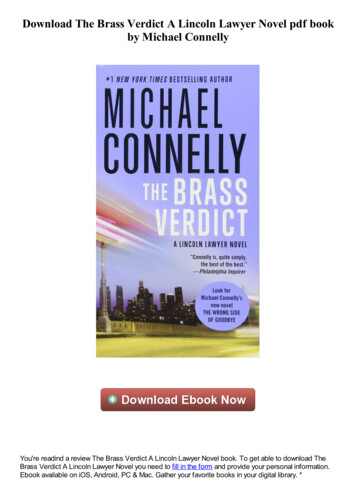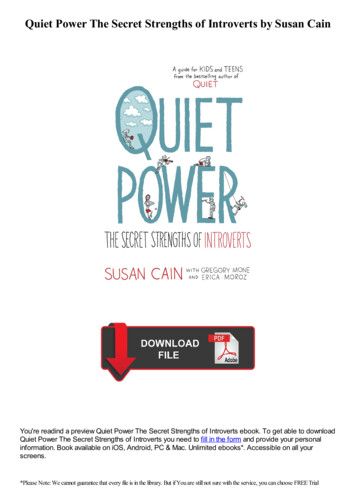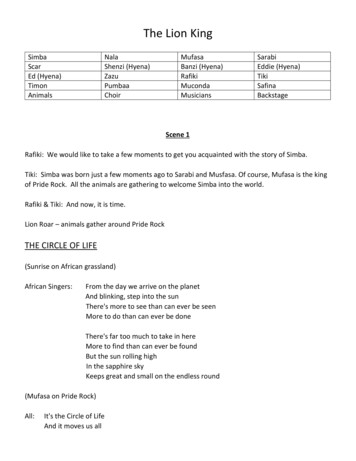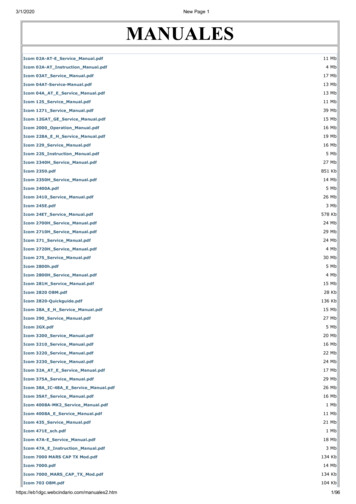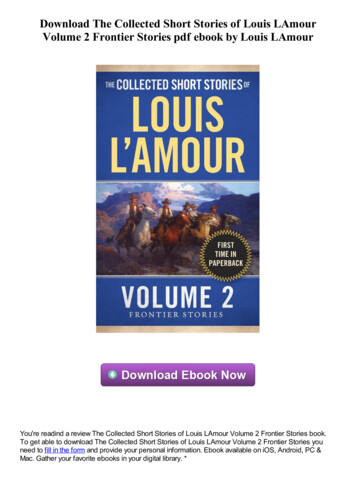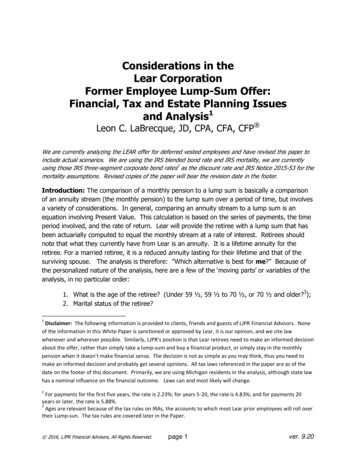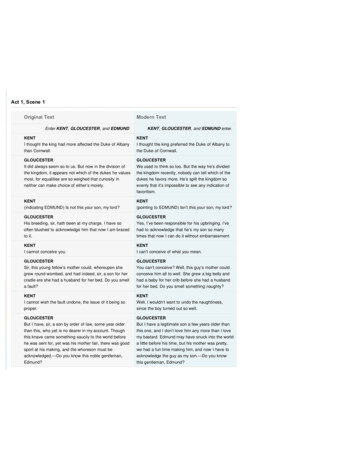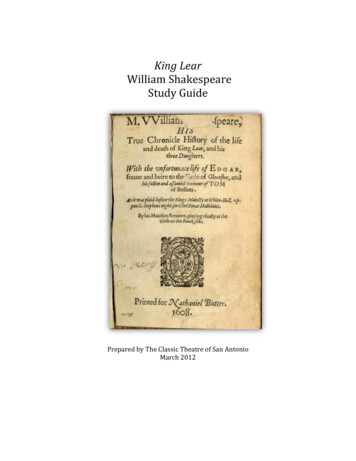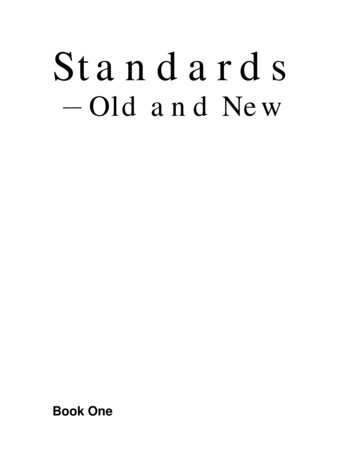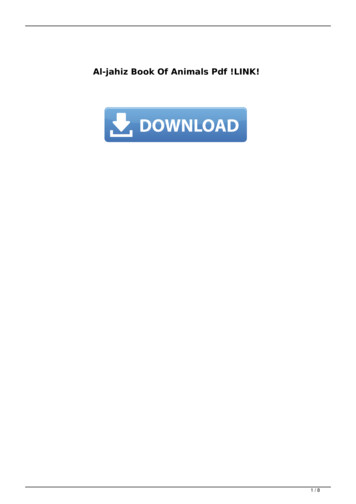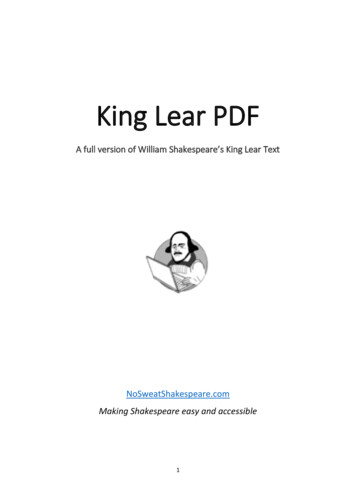
Transcription
King Lear PDFA full version of William Shakespeare’s King Lear TextNoSweatShakespeare.comMaking Shakespeare easy and accessible1
ACT ISCENE I. King Lear's palace.Enter KENT, GLOUCESTER, and EDMUNDKENTI thought the king had more affected the Duke ofAlbany than Cornwall.GLOUCESTERIt did always seem so to us: but now, in thedivision of the kingdom, it appears not which ofthe dukes he values most; for equalities are soweighed, that curiosity in neither can make choiceof either's moiety.KENTIs not this your son, my lord?GLOUCESTERHis breeding, sir, hath been at my charge: I haveso often blushed to acknowledge him, that now I ambrazed to it.KENTI cannot conceive you.GLOUCESTERSir, this young fellow's mother could: whereuponshe grew round-wombed, and had, indeed, sir, a sonfor her cradle ere she had a husband for her bed.Do you smell a fault?KENTI cannot wish the fault undone, the issue of itbeing so proper.GLOUCESTERBut I have, sir, a son by order of law, some yearelder than this, who yet is no dearer in my account:though this knave came something saucily into theworld before he was sent for, yet was his motherfair; there was good sport at his making, and thewhoreson must be acknowledged. Do you know thisnoble gentleman, Edmund?EDMUNDNo, my lord.GLOUCESTER2
My lord of Kent: remember him hereafter as myhonourable friend.EDMUNDMy services to your lordship.KENTI must love you, and sue to know you better.EDMUNDSir, I shall study deserving.GLOUCESTERHe hath been out nine years, and away he shallagain. The king is coming.Sennet. Enter KING LEAR, CORNWALL, ALBANY, GONERIL, REGAN,CORDELIA, and AttendantsKING LEARAttend the lords of France and Burgundy, Gloucester.GLOUCESTERI shall, my liege.Exeunt GLOUCESTER and EDMUNDKING LEARMeantime we shall express our darker purpose.Give me the map there. Know that we have dividedIn three our kingdom: and 'tis our fast intentTo shake all cares and business from our age;Conferring them on younger strengths, while weUnburthen'd crawl toward death. Our son of Cornwall,And you, our no less loving son of Albany,We have this hour a constant will to publishOur daughters' several dowers, that future strifeMay be prevented now. The princes, France and Burgundy,Great rivals in our youngest daughter's love,Long in our court have made their amorous sojourn,And here are to be answer'd. Tell me, my daughters,-Since now we will divest us both of rule,Interest of territory, cares of state,-Which of you shall we say doth love us most?That we our largest bounty may extendWhere nature doth with merit challenge. Goneril,Our eldest-born, speak first.GONERIL3
Sir, I love you more than words can wield the matter;Dearer than eye-sight, space, and liberty;Beyond what can be valued, rich or rare;No less than life, with grace, health, beauty, honour;As much as child e'er loved, or father found;A love that makes breath poor, and speech unable;Beyond all manner of so much I love you.CORDELIA[Aside] What shall Cordelia do?Love, and be silent.LEAROf all these bounds, even from this line to this,With shadowy forests and with champains rich'd,With plenteous rivers and wide-skirted meads,We make thee lady: to thine and Albany's issueBe this perpetual. What says our second daughter,Our dearest Regan, wife to Cornwall? Speak.REGANSir, I am madeOf the self-same metal that my sister is,And prize me at her worth. In my true heartI find she names my very deed of love;Only she comes too short: that I professMyself an enemy to all other joys,Which the most precious square of sense possesses;And find I am alone felicitateIn your dear highness' love.CORDELIA[Aside] Then poor Cordelia!And yet not so; since, I am sure, my love'sMore richer than my tongue.KING LEARTo thee and thine hereditary everRemain this ample third of our fair kingdom;No less in space, validity, and pleasure,Than that conferr'd on Goneril. Now, our joy,Although the last, not least; to whose young loveThe vines of France and milk of BurgundyStrive to be interess'd; what can you say to drawA third more opulent than your sisters? Speak.CORDELIANothing, my lord.4
KING LEARNothing!CORDELIANothing.KING LEARNothing will come of nothing: speak again.CORDELIAUnhappy that I am, I cannot heaveMy heart into my mouth: I love your majestyAccording to my bond; nor more nor less.KING LEARHow, how, Cordelia! mend your speech a little,Lest it may mar your fortunes.CORDELIAGood my lord,You have begot me, bred me, loved me: IReturn those duties back as are right fit,Obey you, love you, and most honour you.Why have my sisters husbands, if they sayThey love you all? Haply, when I shall wed,That lord whose hand must take my plight shall carryHalf my love with him, half my care and duty:Sure, I shall never marry like my sisters,To love my father all.KING LEARBut goes thy heart with this?CORDELIAAy, good my lord.KING LEARSo young, and so untender?CORDELIASo young, my lord, and true.KING LEARLet it be so; thy truth, then, be thy dower:For, by the sacred radiance of the sun,The mysteries of Hecate, and the night;By all the operation of the orbsFrom whom we do exist, and cease to be;Here I disclaim all my paternal care,Propinquity and property of blood,And as a stranger to my heart and me5
Hold thee, from this, for ever. The barbarous Scythian,Or he that makes his generation messesTo gorge his appetite, shall to my bosomBe as well neighbour'd, pitied, and relieved,As thou my sometime daughter.KENTGood my liege,-KING LEARPeace, Kent!Come not between the dragon and his wrath.I loved her most, and thought to set my restOn her kind nursery. Hence, and avoid my sight!So be my grave my peace, as here I giveHer father's heart from her! Call France; who stirs?Call Burgundy. Cornwall and Albany,With my two daughters' dowers digest this third:Let pride, which she calls plainness, marry her.I do invest you jointly with my power,Pre-eminence, and all the large effectsThat troop with majesty. Ourself, by monthly course,With reservation of an hundred knights,By you to be sustain'd, shall our abodeMake with you by due turns. Only we still retainThe name, and all the additions to a king;The sway, revenue, execution of the rest,Beloved sons, be yours: which to confirm,This coronet part betwixt you.Giving the crownKENTRoyal Lear,Whom I have ever honour'd as my king,Loved as my father, as my master follow'd,As my great patron thought on in my prayers,-KING LEARThe bow is bent and drawn, make from the shaft.KENTLet it fall rather, though the fork invadeThe region of my heart: be Kent unmannerly,When Lear is mad. What wilt thou do, old man?Think'st thou that duty shall have dread to speak,When power to flattery bows? To plainness honour's bound,6
When majesty stoops to folly. Reverse thy doom;And, in thy best consideration, chequeThis hideous rashness: answer my life my judgment,Thy youngest daughter does not love thee least;Nor are those empty-hearted whose low soundReverbs no hollowness.KING LEARKent, on thy life, no more.KENTMy life I never held but as a pawnTo wage against thy enemies; nor fear to lose it,Thy safety being the motive.KING LEAROut of my sight!KENTSee better, Lear; and let me still remainThe true blank of thine eye.KING LEARNow, by Apollo,-KENTNow, by Apollo, king,Thou swear'st thy gods in vain.KING LEARO, vassal! miscreant!Laying his hand on his swordALBANY CORNWALLDear sir, forbear.KENTDo:Kill thy physician, and the fee bestowUpon thy foul disease. Revoke thy doom;Or, whilst I can vent clamour from my throat,I'll tell thee thou dost evil.KING LEARHear me, recreant!On thine allegiance, hear me!Since thou hast sought to make us break our vow,Which we durst never yet, and with strain'd prideTo come between our sentence and our power,Which nor our nature nor our place can bear,7
Our potency made good, take thy reward.Five days we do allot thee, for provisionTo shield thee from diseases of the world;And on the sixth to turn thy hated backUpon our kingdom: if, on the tenth day following,Thy banish'd trunk be found in our dominions,The moment is thy death. Away! by Jupiter,This shall not be revoked.KENTFare thee well, king: sith thus thou wilt appear,Freedom lives hence, and banishment is here.To CORDELIAThe gods to their dear shelter take thee, maid,That justly think'st, and hast most rightly said!To REGAN and GONERILAnd your large speeches may your deeds approve,That good effects may spring from words of love.Thus Kent, O princes, bids you all adieu;He'll shape his old course in a country new.ExitFlourish. Re-enter GLOUCESTER, with KING OF FRANCE, BURGUNDY, andAttendantsGLOUCESTERHere's France and Burgundy, my noble lord.KING LEARMy lord of Burgundy.We first address towards you, who with this kingHath rivall'd for our daughter: what, in the least,Will you require in present dower with her,Or cease your quest of love?BURGUNDYMost royal majesty,I crave no more than what your highness offer'd,Nor will you tender less.KING LEARRight noble Burgundy,When she was dear to us, we did hold her so;8
But now her price is fall'n. Sir, there she stands:If aught within that little seeming substance,Or all of it, with our displeasure pieced,And nothing more, may fitly like your grace,She's there, and she is yours.BURGUNDYI know no answer.KING LEARWill you, with those infirmities she owes,Unfriended, new-adopted to our hate,Dower'd with our curse, and stranger'd with our oath,Take her, or leave her?BURGUNDYPardon me, royal sir;Election makes not up on such conditions.KING LEARThen leave her, sir; for, by the power that made me,I tell you all her wealth.To KING OF FRANCEFor you, great king,I would not from your love make such a stray,To match you where I hate; therefore beseech youTo avert your liking a more worthier wayThan on a wretch whom nature is ashamedAlmost to acknowledge hers.KING OF FRANCEThis is most strange,That she, that even but now was your best object,The argument of your praise, balm of your age,Most best, most dearest, should in this trice of timeCommit a thing so monstrous, to dismantleSo many folds of favour. Sure, her offenceMust be of such unnatural degree,That monsters it, or your fore-vouch'd affectionFall'n into taint: which to believe of her,Must be a faith that reason without miracleCould never plant in me.CORDELIAI yet beseech your majesty,-If for I want that glib and oily art,To speak and purpose not; since what I well intend,9
I'll do't before I speak,--that you make knownIt is no vicious blot, murder, or foulness,No unchaste action, or dishonour'd step,That hath deprived me of your grace and favour;But even for want of that for which I am richer,A still-soliciting eye, and such a tongueAs I am glad I have not, though not to have itHath lost me in your liking.KING LEARBetter thouHadst not been born than not to have pleased me better.KING OF FRANCEIs it but this,--a tardiness in natureWhich often leaves the history unspokeThat it intends to do? My lord of Burgundy,What say you to the lady? Love's not loveWhen it is mingled with regards that standAloof from the entire point. Will you have her?She is herself a dowry.BURGUNDYRoyal Lear,Give but that portion which yourself proposed,And here I take Cordelia by the hand,Duchess of Burgundy.KING LEARNothing: I have sworn; I am firm.BURGUNDYI am sorry, then, you have so lost a fatherThat you must lose a husband.CORDELIAPeace be with Burgundy!Since that respects of fortune are his love,I shall not be his wife.KING OF FRANCEFairest Cordelia, that art most rich, being poor;Most choice, forsaken; and most loved, despised!Thee and thy virtues here I seize upon:Be it lawful I take up what's cast away.Gods, gods! 'tis strange that from their cold'st neglectMy love should kindle to inflamed respect.Thy dowerless daughter, king, thrown to my chance,Is queen of us, of ours, and our fair France:10
Not all the dukes of waterish BurgundyCan buy this unprized precious maid of me.Bid them farewell, Cordelia, though unkind:Thou losest here, a better where to find.KING LEARThou hast her, France: let her be thine; for weHave no such daughter, nor shall ever seeThat face of hers again. Therefore be goneWithout our grace, our love, our benison.Come, noble Burgundy.Flourish. Exeunt all but KING OF FRANCE, GONERIL, REGAN, and CORDELIAKING OF FRANCEBid farewell to your sisters.CORDELIAThe jewels of our father, with wash'd eyesCordelia leaves you: I know you what you are;And like a sister am most loath to callYour faults as they are named. Use well our father:To your professed bosoms I commit himBut yet, alas, stood I within his grace,I would prefer him to a better place.So, farewell to you both.REGANPrescribe not us our duties.GONERILLet your studyBe to content your lord, who hath received youAt fortune's alms. You have obedience scanted,And well are worth the want that you have wanted.CORDELIATime shall unfold what plaited cunning hides:Who cover faults, at last shame them derides.Well may you prosper!KING OF FRANCECome, my fair Cordelia.Exeunt KING OF FRANCE and CORDELIAGONERIL11
Sister, it is not a little I have to say of whatmost nearly appertains to us both. I think ourfather will hence to-night.REGANThat's most certain, and with you; next month with us.GONERILYou see how full of changes his age is; theobservation we have made of it hath not beenlittle: he always loved our sister most; andwith what poor judgment he hath now cast her offappears too grossly.REGAN'Tis the infirmity of his age: yet he hath everbut slenderly known himself.GONERILThe best and soundest of his time hath been butrash; then must we look to receive from his age,not alone the imperfections of long-engraffedcondition, but therewithal the unruly waywardnessthat infirm and choleric years bring with them.REGANSuch unconstant starts are we like to have fromhim as this of Kent's banishment.GONERILThere is further compliment of leavetakingbetween France and him. Pray you, let's hittogether: if our father carry authority withsuch dispositions as he bears, this lastsurrender of his will but offend us.REGANWe shall further think on't.GONERILWe must do something, and i' the heat.ExeuntSCENE II. The Earl of Gloucester's castle.Enter EDMUND, with a letterEDMUNDThou, nature, art my goddess; to thy lawMy services are bound. Wherefore should I12
Stand in the plague of custom, and permitThe curiosity of nations to deprive me,For that I am some twelve or fourteen moon-shinesLag of a brother? Why bastard? wherefore base?When my dimensions are as well compact,My mind as generous, and my shape as true,As honest madam's issue? Why brand they usWith base? with baseness? bastardy? base, base?Who, in the lusty stealth of nature, takeMore composition and fierce qualityThan doth, within a dull, stale, tired bed,Go to the creating a whole tribe of fops,Got 'tween asleep and wake? Well, then,Legitimate Edgar, I must have your land:Our father's love is to the bastard EdmundAs to the legitimate: fine word,--legitimate!Well, my legitimate, if this letter speed,And my invention thrive, Edmund the baseShall top the legitimate. I grow; I prosper:Now, gods, stand up for bastards!Enter GLOUCESTERGLOUCESTERKent banish'd thus! and France in choler parted!And the king gone to-night! subscribed his power!Confined to exhibition! All this doneUpon the gad! Edmund, how now! what news?EDMUNDSo please your lordship, none.Putting up the letterGLOUCESTERWhy so earnestly seek you to put up that letter?EDMUNDI know no news, my lord.GLOUCESTERWhat paper were you reading?EDMUNDNothing, my lord.GLOUCESTER13
No? What needed, then, that terrible dispatch ofit into your pocket? the quality of nothing hathnot such need to hide itself. Let's see: come,if it be nothing, I shall not need spectacles.EDMUNDI beseech you, sir, pardon me: it is a letterfrom my brother, that I have not all o'er-read;and for so much as I have perused, I find it notfit for your o'er-looking.GLOUCESTERGive me the letter, sir.EDMUNDI shall offend, either to detain or give it. Thecontents, as in part I understand them, are to blame.GLOUCESTERLet's see, let's see.EDMUNDI hope, for my brother's justification, he wrotethis but as an essay or taste of my virtue.GLOUCESTER[Reads] 'This policy and reverence of age makesthe world bitter to the best of our times; keepsour fortunes from us till our oldness cannot relishthem. I begin to find an idle and fond bondagein the oppression of aged tyranny; who sways, notas it hath power, but as it is suffered. Come tome, that of this I may speak more. If our fatherwould sleep till I waked him, you should half hisrevenue for ever, and live the beloved of yourbrother, EDGAR.'Hum--conspiracy!--'Sleep till I waked him,--youshould enjoy half his revenue,'--My son Edgar!Had he a hand to write this? a heart and brainto breed it in?--When came this to you? whobrought it?EDMUNDIt was not brought me, my lord; there's thecunning of it; I found it thrown in at thecasement of my closet.GLOUCESTERYou know the character to be your brother's?EDMUND14
If the matter were good, my lord, I durst swearit were his; but, in respect of that, I wouldfain think it were not.GLOUCESTERIt is his.EDMUNDIt is his hand, my lord; but I hope his heart isnot in the contents.GLOUCESTERHath he never heretofore sounded you in this business?EDMUNDNever, my lord: but I have heard him oftmaintain it to be fit, that, sons at perfect age,and fathers declining, the father should be asward to the son, and the son manage his revenue.GLOUCESTERO villain, villain! His very opinion in theletter! Abhorred villain! Unnatural, detested,brutish villain! worse than brutish! Go, sirrah,seek him; I'll apprehend him: abominable villain!Where is he?EDMUNDI do not well know, my lord. If it shall pleaseyou to suspend your indignation against mybrother till you can derive from him bettertestimony of his intent, you shall run a certaincourse; where, if you violently proceed againsthim, mistaking his purpose, it would make a greatgap in your own honour, and shake in pieces theheart of his obedience. I dare pawn down my lifefor him, that he hath wrote this to feel myaffection to your honour, and to no furtherpretence of danger.GLOUCESTERThink you so?EDMUNDIf your honour judge it meet, I will place youwhere you shall hear us confer of this, and by anauricular assurance have your satisfaction; andthat without any further delay than this very evening.GLOUCESTERHe cannot be such a monster-15
EDMUNDNor is not, sure.GLOUCESTERTo his father, that so tenderly and entirelyloves him. Heaven and earth! Edmund, seek himout: wind me into him, I pray you: frame thebusiness after your own wisdom. I would unstatemyself, to be in a due resolution.EDMUNDI will seek him, sir, presently: convey thebusiness as I shall find means and acquaint you withal.GLOUCESTERThese late eclipses in the sun and moon portendno good to us: though the wisdom of nature canreason it thus and thus, yet nature finds itselfscourged by the sequent effects: love cools,friendship falls off, brothers divide: incities, mutinies; in countries, discord; inpalaces, treason; and the bond cracked 'twixt sonand father. This villain of mine comes under theprediction; there's son against father: the kingfalls from bias of nature; there's father againstchild. We have seen the best of our time:machinations, hollowness, treachery, and allruinous disorders, follow us disquietly to ourgraves. Find out this villain, Edmund; it shalllose thee nothing; do it carefully. And thenoble and true-hearted Kent banished! hisoffence, honesty! 'Tis strange.ExitEDMUNDThis is the excellent foppery of the world, that,when we are sick in fortune,--often the surfeitof our own behavior,--we make guilty of ourdisasters the sun, the moon, and the stars: asif we were villains by necessity; fools byheavenly compulsion; knaves, thieves, andtreachers, by spherical predominance; drunkards,liars, and adulterers, by an enforced obedience ofplanetary influence; and all that we are evil in,by a divine thrusting on: an admirable evasionof whoremaster man, to lay his goatish16
disposition to the charge of a star! Myfather compounded with my mother under thedragon's tail; and my nativity was under Ursamajor; so that it follows, I am rough andlecherous. Tut, I should have been that I am,had the maidenliest star in the firmamenttwinkled on my bastardizing. Edgar-Enter EDGARAnd pat he comes like the catastrophe of the oldcomedy: my cue is villanous melancholy, with asigh like Tom o' Bedlam. O, these eclipses doportend these divisions! fa, sol, la, mi.EDGARHow now, brother Edmund! what seriouscontemplation are you in?EDMUNDI am thinking, brother, of a prediction I readthis other day, what should follow these eclipses.EDGARDo you busy yourself about that?EDMUNDI promise you, the effects he writes of succeedunhappily; as of unnaturalness between the childand the parent; death, dearth, dissolutions ofancient amities; divisions in state, menaces andmaledictions against king and nobles; needlessdiffidences, banishment of friends, dissipationof cohorts, nuptial breaches, and I know not what.EDGARHow long have you been a sectary astronomical?EDMUNDCome, come; when saw you my father last?EDGARWhy, the night gone by.EDMUNDSpake you with him?EDGARAy, two hours together.EDMUND17
Parted you in good terms? Found you nodispleasure in him by word or countenance?EDGARNone at all.EDMUNDBethink yourself wherein you may have offendedhim: and at my entreaty forbear his presencetill some little time hath qualified the heat ofhis displeasure; which at this instant so ragethin him, that with the mischief of your person itwould scarcely allay.EDGARSome villain hath done me wrong.EDMUNDThat's my fear. I pray you, have a continentforbearance till the spied of his rage goesslower; and, as I say, retire with me to mylodging, from whence I will fitly bring you tohear my lord speak: pray ye, go; there's my key:if you do stir abroad, go armed.EDGARArmed, brother!EDMUNDBrother, I advise you to the best; go armed: Iam no honest man if there be any good meaningtowards you: I have told you what I have seenand heard; but faintly, nothing like the imageand horror of it: pray you, away.EDGARShall I hear from you anon?EDMUNDI do serve you in this business.Exit EDGARA credulous father! and a brother noble,Whose nature is so far from doing harms,That he suspects none: on whose foolish honestyMy practises ride easy! I see the business.Let me, if not by birth, have lands by wit:All with me's meet that I can fashion fit.18
ExitSCENE III. The Duke of Albany's palace.Enter GONERIL, and OSWALD, her stewardGONERILDid my father strike my gentleman for chiding of his fool?OSWALDYes, madam.GONERILBy day and night he wrongs me; every hourHe flashes into one gross crime or other,That sets us all at odds: I'll not endure it:His knights grow riotous, and himself upbraids usOn every trifle. When he returns from hunting,I will not speak with him; say I am sick:If you come slack of former services,You shall do well; the fault of it I'll answer.OSWALDHe's coming, madam; I hear him.Horns withinGONERILPut on what weary negligence you please,You and your fellows; I'll have it come to question:If he dislike it, let him to our sister,Whose mind and mine, I know, in that are one,Not to be over-ruled. Idle old man,That still would manage those authoritiesThat he hath given away! Now, by my life,Old fools are babes again; and must be usedWith cheques as flatteries,--when they are seen abused.Remember what I tell you.OSWALDWell, madam.GONERILAnd let his knights have colder looks among you;What grows of it, no matter; advise your fellows so:I would breed from hence occasions, and I shall,That I may speak: I'll write straight to my sister,To hold my very course. Prepare for dinner.19
ExeuntSCENE IV. A hall in the same.Enter KENT, disguisedKENTIf but as well I other accents borrow,That can my speech defuse, my good intentMay carry through itself to that full issueFor which I razed my likeness. Now, banish'd Kent,If thou canst serve where thou dost stand condemn'd,So may it come, thy master, whom thou lovest,Shall find thee full of labours.Horns within. Enter KING LEAR, Knights, and AttendantsKING LEARLet me not stay a jot for dinner; go get it ready.Exit an AttendantHow now! what art thou?KENTA man, sir.KING LEARWhat dost thou profess? what wouldst thou with us?KENTI do profess to be no less than I seem; to servehim truly that will put me in trust: to love himthat is honest; to converse with him that is wise,and says little; to fear judgment; to fight when Icannot choose; and to eat no fish.KING LEARWhat art thou?KENTA very honest-hearted fellow, and as poor as the king.KING LEARIf thou be as poor for a subject as he is for aking, thou art poor enough. What wouldst thou?KENTService.KING LEAR20
Who wouldst thou serve?KENTYou.KING LEARDost thou know me, fellow?KENTNo, sir; but you have that in your countenancewhich I would fain call master.KING LEARWhat's that?KENTAuthority.KING LEARWhat services canst thou do?KENTI can keep honest counsel, ride, run, mar a curioustale in telling it, and deliver a plain messagebluntly: that which ordinary men are fit for, I amqualified in; and the best of me is diligence.KING LEARHow old art thou?KENTNot so young, sir, to love a woman for singing, norso old to dote on her for any thing: I have yearson my back forty eight.KING LEARFollow me; thou shalt serve me: if I like thee noworse after dinner, I will not part from thee yet.Dinner, ho, dinner! Where's my knave? my fool?Go you, and call my fool hither.Exit an AttendantEnter OSWALDYou, you, sirrah, where's my daughter?OSWALDSo please you,-Exit21
KING LEARWhat says the fellow there? Call the clotpoll back.Exit a KnightWhere's my fool, ho? I think the world's asleep.Re-enter KnightHow now! where's that mongrel?KnightHe says, my lord, your daughter is not well.KING LEARWhy came not the slave back to me when I called him.KnightSir, he answered me in the roundest manner, he wouldnot.KING LEARHe would not!KnightMy lord, I know not what the matter is; but, to myjudgment, your highness is not entertained with thatceremonious affection as you were wont; there's agreat abatement of kindness appears as well in thegeneral dependants as in the duke himself also andyour daughter.KING LEARHa! sayest thou so?KnightI beseech you, pardon me, my lord, if I be mistaken;for my duty cannot be silent when I think yourhighness wronged.KING LEARThou but rememberest me of mine own conception: Ihave perceived a most faint neglect of late; which Ihave rather blamed as mine own jealous curiositythan as a very pretence and purpose of unkindness:I will look further into't. But where's my fool? Ihave not seen him this two days.KnightSince my young lady's going into France, sir, thefool hath much pined away.22
KING LEARNo more of that; I have noted it well. Go you, andtell my daughter I would speak with her.Exit an AttendantGo you, call hither my fool.Exit an AttendantRe-enter OSWALDO, you sir, you, come you hither, sir: who am I,sir?OSWALDMy lady's father.KING LEAR'My lady's father'! my lord's knave: yourwhoreson dog! you slave! you cur!OSWALDI am none of these, my lord; I beseech your pardon.KING LEARDo you bandy looks with me, you rascal?Striking himOSWALDI'll not be struck, my lord.KENTNor tripped neither, you base football player.Tripping up his heelsKING LEARI thank thee, fellow; thou servest me, and I'lllove thee.KENTCome, sir, arise, away! I'll teach you differences:away, away! if you will measure your lubber'slength again, tarry: but away! go to; have youwisdom? so.Pushes OSWALD out23
KING LEARNow, my friendly knave, I thank thee: there'searnest of thy service.Giving KENT moneyEnter FoolFoolLet me hire him too: here's my coxcomb.Offering KENT his capKING LEARHow now, my pretty knave! how dost thou?FoolSirrah, you were best take my coxcomb.KENTWhy, fool?FoolWhy, for taking one's part that's out of favour:nay, an thou canst not smile as the wind sits,thou'lt catch cold shortly: there, take my coxcomb:why, this fellow has banished two on's daughters,and did the third a blessing against his will; ifthou follow him, thou must needs wear my coxcomb.How now, nuncle! Would I had two coxcombs and two daughters!KING LEARWhy, my boy?FoolIf I gave them all my living, I'ld keep my coxcombsmyself. There's mine; beg another of thy daughters.KING LEARTake heed, sirrah; the whip.FoolTruth's a dog must to kennel; he must be whippedout, when Lady the brach may stand by the fire and stink.KING LEARA pestilent gall to me!FoolSirrah, I'll teach thee a speech.KING LEAR24
Do.FoolMark it, nuncle:Have more than thou showest,Speak less than thou knowest,Lend less than thou owest,Ride more than thou goest,Learn more than thou trowest,Set less than thou throwest;Leave thy drink and thy whore,And keep in-a-door,And thou shalt have moreThan two tens to a score.KENTThis is nothing, fool.FoolThen 'tis like the breath of an unfee'd lawyer; yougave me nothing for't. Can you make no use ofnothing, nuncle?KING LEARWhy, no, boy; nothing can be made out of nothing.Fool[To KENT] Prithee, tell him, so much the rent ofhis land comes to: he will not believe a fool.KING LEARA bitter fool!FoolDost thou know the difference, my boy, between abitter fool and a sweet fool?KING LEARNo, lad; teach me.FoolThat lord that counsell'd theeTo give away thy land,Come place him here by me,Do thou for him stand:The sweet and bitter foolWill presently appear;The one in motley here,The other found out there.KING LEAR25
Dost thou call me fool, boy?FoolAll thy other titles thou hast given away; thatthou wast born with.KENTThis is not altogether fool, my lord.FoolNo, faith, lords and great men will not let me; ifI had a monopoly out, they would have part on't:and ladies too, they will not let me have all foolto myself; they'll be snatching. Give me an egg,nuncle, and I'll give thee two crowns.KING LEARWhat two crowns shall they be?FoolWhy, after I have cut
A full version of William Shakespeare's King Lear Text NoSweatShakespeare.com Making Shakespeare easy and accessible . 2 ACT I . Our eldest-born, speak first. GONERIL. 4 Sir, I love you more than words can wield the matter; Dearer than eye-sight, space, and liberty;
